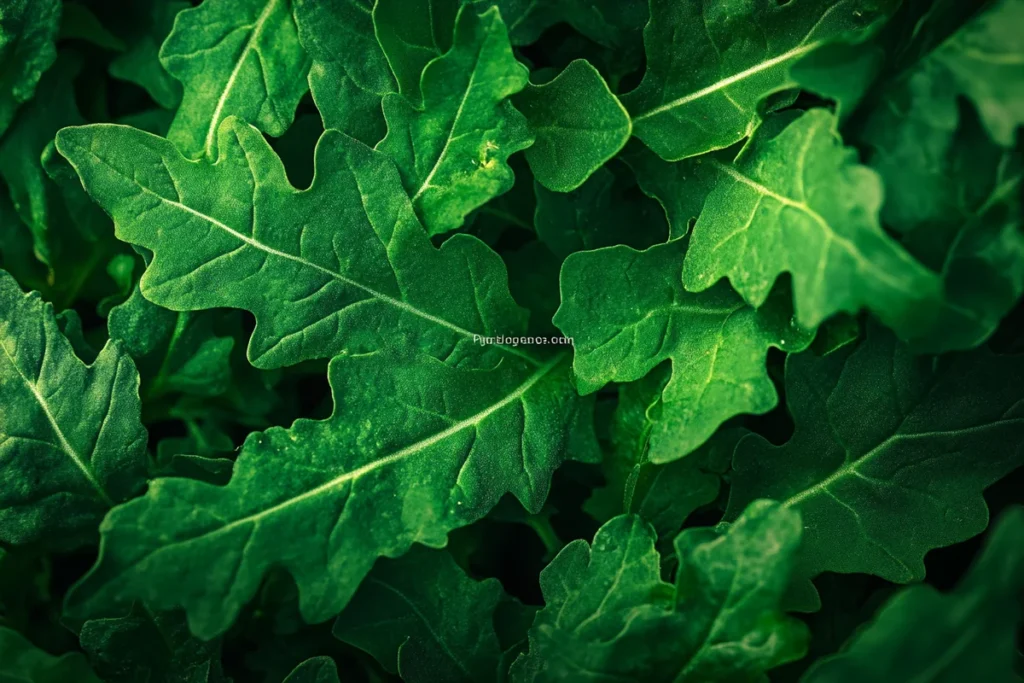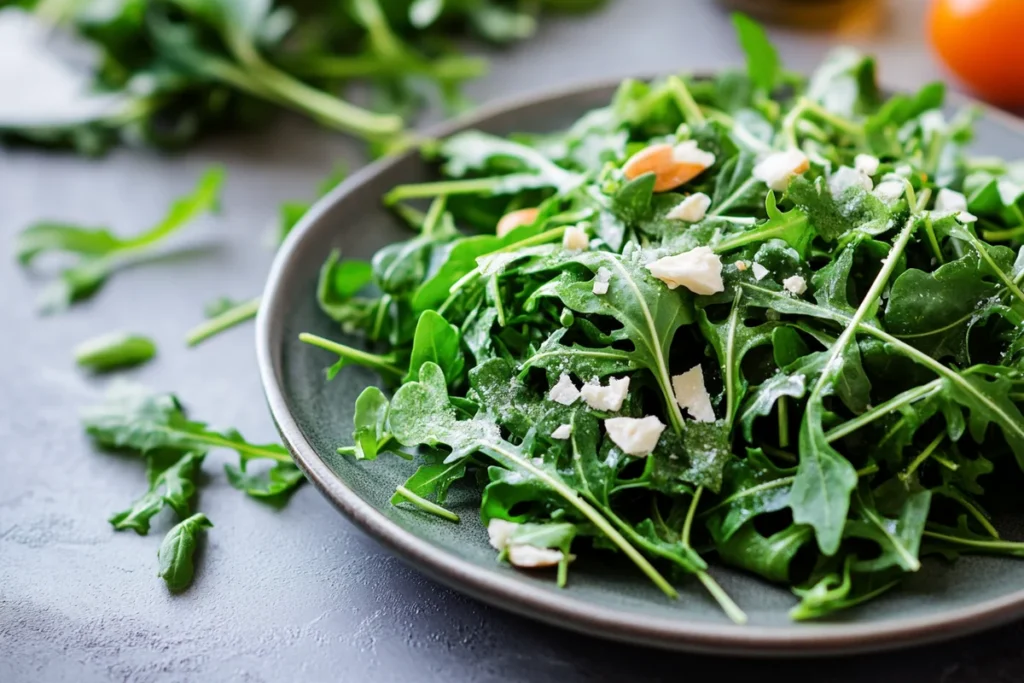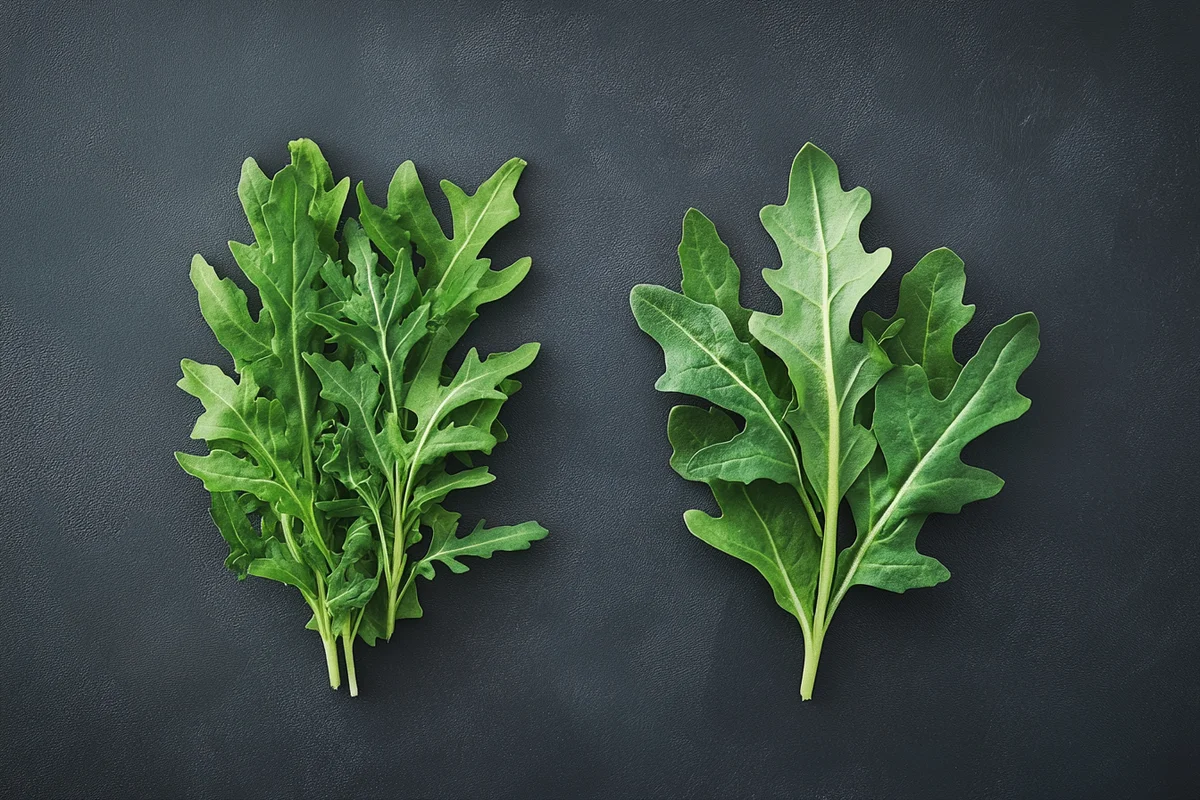What Is Rocket Salad?
Understanding Rocket Salad
Rocket salad, also known by its botanical name Eruca vesicaria, is a leafy green that packs a distinctive, peppery punch. Popular in many Mediterranean and Middle Eastern cuisines, it is widely celebrated for its vibrant flavor and tender texture. This versatile green is used in a variety of dishes, ranging from salads and sandwiches to pesto and pasta toppings.
Historically, rocket salad has been a staple in European diets for centuries. It’s believed to have originated in the Mediterranean region, where it was highly prized for its unique taste and supposed medicinal properties. Ancient Romans even considered it an aphrodisiac—yes, you read that right! The name “rocket” itself is thought to have been derived from the Italian word rucola, which reflects its cultural roots.
Rocket salad is a fast-growing, cool-season crop that thrives in both wild and cultivated forms. Its leaves are tender, dark green, and often have a jagged or lobed shape, making it easy to distinguish from other salad greens. The peppery flavor comes from its sulfur-containing compounds, which are characteristic of plants in the Brassicaceae family—a family that also includes broccoli, kale, and radishes.
Rocket Salad in Different Regions
The name “rocket salad” isn’t universal. In fact, it’s called different things depending on where you are. For example:
- In Italy, it’s known as rucola or rughetta.
- The French refer to it as roquette.
- In the United Kingdom, it’s affectionately called rocket.
- Meanwhile, in the United States, it’s commonly labeled as arugula.
Interestingly, this regional naming convention often creates confusion. For instance, Americans walking through a British market might not realize that rocket salad is exactly the same leafy green they know as arugula. This cultural quirk highlights how food terminologies often differ across the globe, despite referring to the same item.
Rocket salad’s prominence isn’t just about its name or history. Its popularity stems from its ability to enhance dishes with a bold, peppery kick that’s hard to replicate with other greens. Whether used raw in salads, slightly wilted in warm dishes, or blended into dips and sauces, its flavor shines through, making it a favorite among chefs and home cooks alike.
For more insights into how leafy greens like rocket salad are classified and used in different parts of the world, visit BBC Good Food for a global culinary perspective.
What Is Arugula?

Understanding Arugula
Arugula, like rocket salad, is a peppery green that belongs to the Brassicaceae family. This nutrient-packed leafy vegetable goes by several names, including garden rocket and Eruca vesicaria. But what truly sets arugula apart is its remarkable versatility. It’s adored not only for its bold flavor but also for the depth it brings to dishes ranging from light salads to hearty entrees.
Native to the Mediterranean region, arugula has a rich history that dates back thousands of years. Ancient Egyptians, Greeks, and Romans regarded it as a prized crop, not just for its culinary value but also for its medicinal properties. The Greeks, for example, believed that arugula seeds could enhance digestion and boost overall vitality. While its use has expanded worldwide, it remains a cornerstone of Mediterranean cuisine.
Arugula’s flavor profile is slightly peppery, with a nutty undertone and a hint of bitterness. Younger leaves tend to be milder, while mature leaves pack a spicier punch. This makes arugula a versatile green that can adapt to a variety of culinary creations, offering both flavor and texture.
Variations of Arugula
Not all arugula is created equal! The plant comes in two primary forms: wild arugula (Diplotaxis tenuifolia) and the more common cultivated variety (Eruca vesicaria). Both share similarities in appearance and taste, but there are notable distinctions:
- Wild Arugula: The leaves are smaller, thinner, and more deeply lobed. It boasts an even spicier, more pungent flavor compared to the cultivated kind. Wild arugula grows naturally in many parts of Europe and thrives in less manicured conditions.
- Cultivated Arugula: This type is what you’re most likely to find in grocery stores. Its leaves are broader and less spicy than the wild variety, making it a popular choice for salads and sandwiches.
Aside from its flavor, arugula also offers impressive nutritional benefits. It’s a rich source of vitamins like vitamin K, vitamin A, and vitamin C, as well as minerals such as potassium and calcium. Its antioxidant properties further boost its reputation as a superfood.
To learn more about the nutritional value of arugula and its role in a healthy diet, check out Healthline, which provides comprehensive information on leafy greens and their health benefits.
Rocket Salad vs. Arugula: Are They the Same?
Similarities Between Rocket Salad and Arugula
Let’s cut to the chase: rocket salad and arugula are essentially the same plant. Both belong to the species Eruca vesicaria, and their peppery taste, nutrient content, and visual appearance are nearly identical. These greens even share their culinary versatility, making them go-to ingredients for everything from fresh salads to gourmet pizzas.
What makes them so similar? First, they both hail from the Brassicaceae family, which is known for its sulfur-containing compounds. These compounds are responsible for their distinctive, sharp flavor. Second, their physical characteristics align perfectly: both have dark green, lobed leaves that are soft yet slightly firm to the touch. And finally, when it comes to taste, both deliver a bold, peppery kick that’s balanced with nutty undertones.
Rocket and arugula also have shared cultural significance. Whether you call it rocket, rucola, or arugula, this leafy green has been a dietary staple for centuries in Mediterranean countries, where it’s often used in traditional dishes. Today, both names are used interchangeably depending on the region, which we’ll explore further in the next section.
Key Differences Between Rocket Salad and Arugula
While rocket salad and arugula are technically the same plant, there are some differences worth noting—most of them linguistic and cultural rather than botanical. Here are a few distinctions to consider:
- Regional Naming Conventions: The term “rocket salad” is predominantly used in British English, while “arugula” is favored in American English. For instance, if you’re dining in the UK, your menu might feature “rocket salad with goat’s cheese,” whereas a US menu might offer “arugula salad with goat cheese.”
- Culinary Variations: In some regions, the wild variety of rocket salad is more commonly used, which tends to have a stronger, spicier flavor compared to the milder cultivated arugula often found in supermarkets.
- Availability and Labeling: The name you see on packaging can differ depending on the region. In European countries like Italy, you’ll find it labeled as rucola. In the US, arugula dominates grocery store shelves. This discrepancy can sometimes confuse shoppers traveling internationally or exploring new cuisines.
Ultimately, these differences are superficial. Whether you’re buying rocket in London or arugula in New York, you’re getting the same bold-flavored, nutrient-packed green.
For a deeper look at the cultural context of rocket salad and its regional naming conventions, the BBC Good Food website provides an excellent explanation of how food terms vary globally.
Culinary Uses of Rocket Salad and Arugula

Common Recipes Featuring Rocket Salad and Arugula
Rocket salad and arugula are beloved staples in the culinary world, primarily for their ability to enhance dishes with a bold, peppery flavor. These greens thrive in recipes where freshness and contrast are key. Whether you’re preparing a summer salad or a comforting pasta dish, these versatile greens deliver in spades.
Here are a few popular ways they’re used:
- Fresh Salads: Combine rocket or arugula with cherry tomatoes, shaved Parmesan, and a light vinaigrette for a simple yet flavorful salad. Adding fruits like pears or figs elevates the sweetness to balance the peppery bite.
- Pasta Dishes: Tossing fresh arugula into hot pasta at the last moment creates a delightful wilted texture. It’s commonly paired with olive oil, garlic, and red pepper flakes.
- Pizza Toppings: After baking, arugula can be scattered atop pizzas for a burst of freshness. Its spicy notes pair beautifully with creamy cheeses like mozzarella or tangy goat cheese.
- Sandwiches and Wraps: Replace iceberg lettuce or spinach with rocket to give your sandwiches a more sophisticated taste.
These dishes highlight how rocket salad and arugula shine as both the star of a dish and a supporting ingredient. Their vibrant flavor ensures that every bite is memorable.
Rocket Salad and Arugula as Garnishes
One of the lesser-known uses of rocket salad and arugula is as a garnish. In fine dining and casual cooking alike, they’re used to add a pop of color, texture, and a peppery zing to plates. Here are a few ideas:
- Soups: Top creamy soups, such as butternut squash or tomato bisque, with a handful of fresh arugula for added texture.
- Egg Dishes: Sprinkle rocket leaves over omelets, frittatas, or scrambled eggs for a breakfast with a gourmet twist.
- Appetizers: Use arugula to garnish bruschetta, crostini, or charcuterie boards, adding a fresh and flavorful contrast to richer components like meats or cheeses.
As a garnish, arugula not only enhances the presentation of a dish but also provides a subtle layer of flavor that elevates even the simplest recipes.
Substitutes for Rocket Salad and Arugula
What if you’re out of rocket or arugula? Don’t fret! There are several greens that can serve as excellent substitutes, depending on the dish:
- Watercress: This leafy green shares a similar peppery flavor, though it’s slightly milder. Perfect for salads and sandwiches.
- Baby Spinach: A milder alternative, baby spinach works well in recipes where you want the texture of rocket without the strong bite.
- Mustard Greens: For those who love spice, mustard greens deliver a robust kick, making them ideal for hearty recipes.
Choosing the right substitute depends on the dish. For example, if you’re making a salad where rocket’s flavor is key, watercress would be a closer match than spinach.
To explore recipes with arugula and its substitutes, visit Healthline, which offers creative ideas for incorporating leafy greens into your diet.
Nutritional Benefits and Health Properties

Nutritional Composition
Rocket salad and arugula may be small in size, but they’re undeniably big on nutrients. These leafy greens are nutritional powerhouses, packed with essential vitamins, minerals, and antioxidants that contribute to overall health. If you’re looking to add more greens to your diet, these are fantastic options.
Here’s what makes rocket and arugula so nutritious:
- Vitamins: Both are excellent sources of Vitamin K, essential for blood clotting and bone health. They also contain Vitamin A, which supports vision and immune function, and Vitamin C, a powerful antioxidant.
- Minerals: They’re rich in calcium, potassium, and magnesium, which help maintain healthy bones, regulate blood pressure, and support muscle function.
- Low in Calories: With just a few calories per serving, these greens are perfect for anyone watching their weight while seeking nutrient-dense foods.
- Fiber: Rocket and arugula provide a moderate amount of fiber, which aids digestion and promotes gut health.
Their nutrient composition makes them not only a flavorful addition to meals but also a functional one that supports a healthy lifestyle.
Health Benefits of Rocket Salad and Arugula
Thanks to their impressive nutritional profile, rocket salad and arugula offer numerous health benefits. Incorporating these greens into your diet can support your overall well-being in the following ways:
- Heart Health: Their potassium content helps regulate blood pressure, while antioxidants reduce oxidative stress, protecting the heart from damage.
- Bone Strength: The Vitamin K in rocket and arugula plays a critical role in bone metabolism, reducing the risk of osteoporosis.
- Improved Digestion: The fiber in these greens promotes a healthy gut microbiome, aiding digestion and preventing constipation.
- Antioxidant Protection: Antioxidants like Vitamin C and beta-carotene combat free radicals, potentially lowering the risk of chronic diseases like cancer.
- Immune Support: With immune-boosting vitamins such as A and C, rocket and arugula help keep colds and infections at bay.
Are Rocket Salad and Arugula Safe for Everyone?
While rocket and arugula are healthy choices for most people, there are a few considerations to keep in mind:
- Oxalates: These greens contain oxalates, which can contribute to kidney stone formation in individuals prone to the condition. Moderation is key if you have a history of kidney stones.
- Allergies or Sensitivities: Although rare, some individuals may experience mild allergies to rocket or arugula. Symptoms might include itching or mild stomach discomfort.
- Thyroid Considerations: Like other cruciferous vegetables, these greens contain goitrogens, which can interfere with thyroid function if consumed in excessive amounts, especially when raw. However, cooking them can help mitigate this effect.
Overall, these greens are incredibly safe and beneficial when consumed in moderation as part of a balanced diet. Their versatility ensures that you’ll never run out of ways to enjoy them—whether raw, cooked, or blended into sauces and soups.
FAQs: Is Rocket Salad the Same as Arugula?
Frequently Asked Questions
Why is rocket salad called arugula in some countries?
The difference in naming stems from linguistic and cultural variations. The term “rocket” comes from the Italian word rucola, which evolved into roquette in French and eventually into “rocket” in British English. On the other hand, the term “arugula” is a more direct adoption of the Italian rucola into American English. Though the names differ, they refer to the same plant.
Can I use rocket salad instead of arugula in recipes?
Absolutely! Since rocket and arugula are the same leafy green, they can be used interchangeably in recipes. Whether you’re making a salad, pizza topping, or sandwich filler, the result will taste just as delicious. Just keep in mind that younger leaves tend to be milder, while mature ones have a spicier flavor, so adjust quantities to match your preference.
What does rocket salad taste like compared to arugula?
Rocket salad and arugula share the same peppery, nutty flavor profile because they are the same plant. However, slight variations in taste may occur depending on how the greens are grown. For example, wild varieties tend to have a stronger, spicier taste compared to the milder cultivated types often sold in grocery stores.
Are there any health risks associated with eating arugula or rocket salad?
Generally, rocket and arugula are very safe to eat and are packed with nutrients. However, people with specific health conditions, such as kidney issues or thyroid problems, should consume them in moderation due to their oxalate and goitrogen content. Additionally, individuals with allergies to cruciferous vegetables may experience mild symptoms when consuming these greens.
How do I store rocket salad and arugula to keep them fresh?
To keep rocket and arugula fresh, store them in the refrigerator. Place the leaves in a plastic bag or airtight container with a paper towel to absorb excess moisture. Avoid washing them until just before use, as excess moisture can cause the leaves to wilt faster. Properly stored, they’ll stay fresh for about 3–5 days.
Is there a difference in nutrition between wild and cultivated arugula?.
Both wild and cultivated arugula are highly nutritious, but wild varieties often have slightly higher levels of certain vitamins and minerals due to their natural growing conditions. They also tend to have a stronger, more concentrated flavor compared to the milder cultivated type. Whether you choose wild or cultivated, you’re still getting a healthy dose of nutrients like Vitamin K, Vitamin C, and potassium.
Conclusion
Final Thoughts on Rocket Salad and Arugula
Rocket salad and arugula are, without a doubt, one and the same. They may go by different names in different parts of the world, but they share the same botanical identity, nutritional profile, and peppery flavor that food lovers everywhere adore. Whether you’re in London asking for “rocket” or in New York shopping for “arugula,” you’re getting the same bold, vibrant leafy green that brings life to salads, pizzas, pastas, and more.
As we’ve explored, these greens are not only versatile in the kitchen but also offer impressive health benefits, from supporting strong bones to promoting heart health. The slight variations between wild and cultivated varieties only add to their culinary appeal, allowing you to tailor your dishes to your taste preferences.
So, the next time you find yourself wondering whether rocket salad and arugula are different, remember this: they are one plant with many names, loved across the globe for their zesty flavor and nutritional value. Now that you’re armed with all the facts, it’s time to embrace this leafy green in your meals and enjoy its benefits to the fullest!
This concludes the article! You now have an SEO-optimized, engaging, and informative piece on “Is Rocket Salad the Same as Arugula?” that’s ready to educate and entertain readers.

